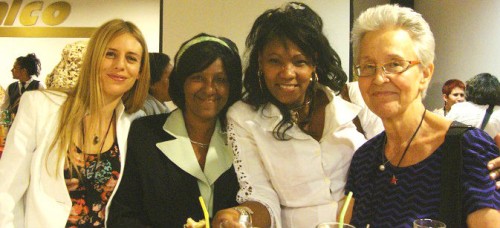Kajsa Ekis Ekman is a culture journalist, debater and writer. Her debut “Varat och varan” deals with prostitution, surrogate motherhood and the duality of man. It became one of the most hotly debated books when it was released fall 2010. Kajsa will participate on the Anti-trafficking day at Moderna Museet on October 17. Kajsa shares her experiences here and now and on the blog.
Kajsa Ekis Ekman at a conference in Cuba together with CENESEX, the Cuban National Center for Sex Education.
When Sweden prohibited the purchasing of sexual services in 1999, it was world news. 50 day fines rarely causes so much attention. The punishment for sex buyers is generally not more than that. It is less than the punishment for illegal file sharing, changing the price tag on a shrimp-sandwich at ICA and even what an exhibitionist can get.
But the sentiment of international media was hysterical: how could Sweden prohibit the world’s oldest profession? Most countries in the world, even where prostitution is illegal fine prostitutes in one way or another. What was unusual with Sweden was the focus on the buyers. Thus, an ancient male privilege was questioned: the right to the bodies of women (as well as children and men of lower social class).
Thirteen years later things look different. Norway and Iceland have introduced similar laws and in Norway a further step has been taken and buying sex abroad is even illegal. France and Denmark are on the path and the next country could be Cuba.
Since the beginning of the nineties, the so-called “special period” when Soviet fell and Cuba lost its biggest trade partner, there has been a problem with increased prostitution. Poverty pushed many Cubans into prostitution. But it is not Cubans paying for sex but foreign sex tourists.
At first, the authorities turned a blind eye to this and did as most countries in the world do: punish the prostitutes and get them off the streets like they were an “inconvenience.” There is even a myth among sex tourists and Cubans that prostitution on Cuba isn’t “real” prostitution, but instead about tourists who get a girlfriend or boyfriend and even supports them economically. A relationship which is even romanticized in music like the Guatemalan singer Ricardo Arjonas’ song “El gringo y la cubana.” The problem with sex tourism in Cuba has become so vast that the authorities have decided to look for solutions. One of the models they look at is the Swedish Sex Trade Law.
Chairwoman for CENESEX, Mariela Castro, has been to Stockholm and in January this year, a conference about sexuality matters was held in Havana.
I was there with Antoinette Kinnander from the Prostitution Unit in Stockholm and talked about how it works in Sweden. The conference consisted of similar themes like those in Europe: LGBT rights, sex change for transsexuals and violence against women. While the research made on violence against women and the sex lives of Cubans has come a long way (for example, ambitious studies where they ask Cubans where they usually have sex and when) prostitution is not as much studied.
But CENESEX showed interest in the Sex Trade Law and a new conference will be arranged next year. Because Cuba is considered a leading country in health matters (the first to provide free medical care and abortions) it is very possible that other Latin American countries will follow suit. This would mark an important step for a continent where sex trade brings in 16 billion dollars every year but is often socially accepted.
Kajsa Ekis Ekman for RealStars
FOR FAIR SEX – campaign! Sign petition!



